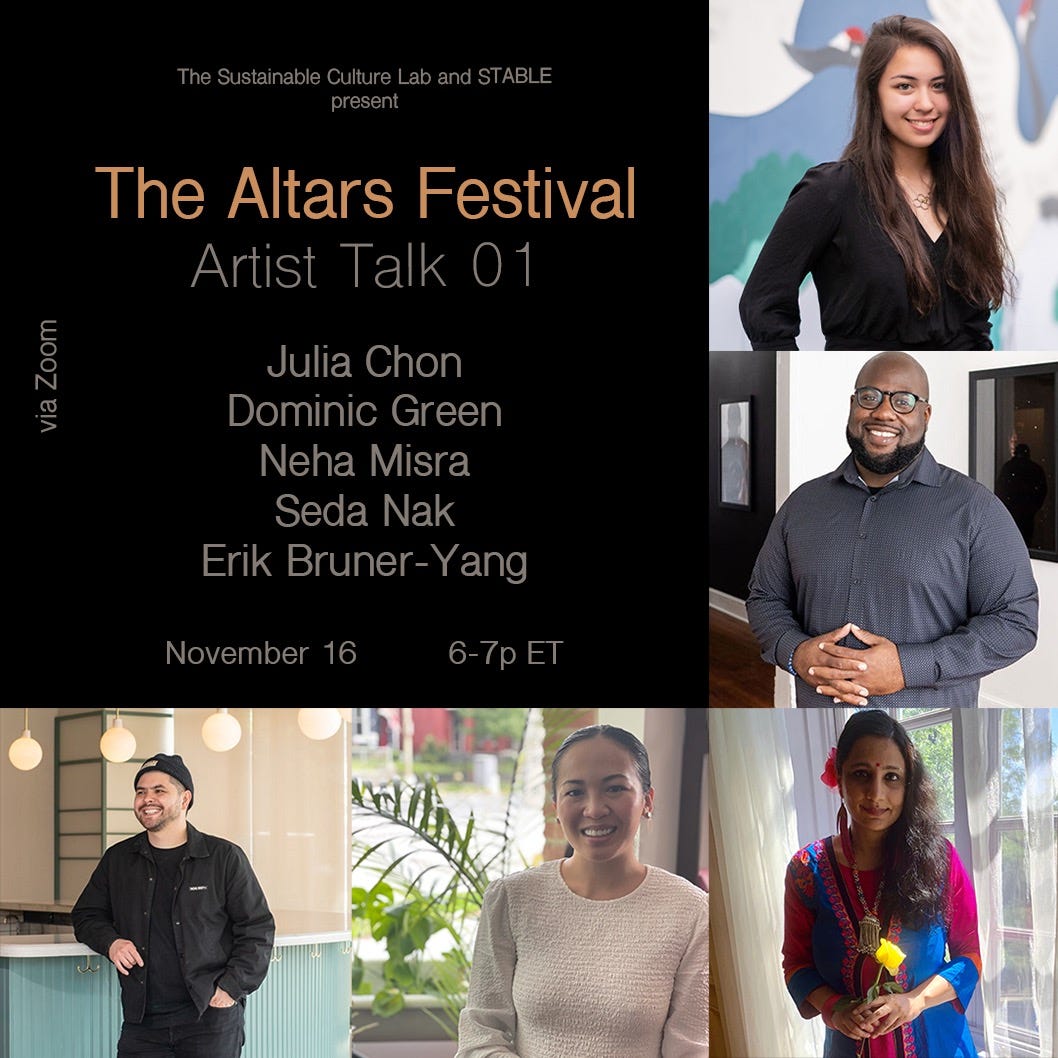Homo Economicus • noun • (ho-mo eh-kuh-naw-mih-cuss)
Definition: Economic man
Origin: English and Latin
To help sustain and grow The Word with Barrett Holmes Pitner we have introduced a subscription option to the newsletter. Subscribers will allow us to continue producing The Word, and create exciting new content including podcasts and new newsletters.
Subscriptions start at $5 a month, and if you would like to give more you can sign up as a Founding Member and name your price.
We really enjoy bringing you The Word each week and we thank you for supporting our work.
My book THE CRIME WITHOUT A NAME was released on October 12, 2021!
The book has received glowing reviews and Publishers Weekly says that THE CRIME WITHOUT A NAME is one of the top books of Fall 2021.
You can order the book—including the audiobook—and watch recordings of my book tour discussions at Eaton and the New York Public Library at thecrimewithoutaname.com.
Earlier this week, I had a conversation with a friend of mine from Colombia about some of the many manifestations of ethnocide in everyday life and the connection between ethnocide and gentrification.
When America talks about gentrification, the conversation is normally a mixture of economics and race, but rarely one about culture. I never like these racial conversations and instead try to shift the conversation to one about culture. Gentrification is not problematic because white people, or people who cling to a white essence, have moved into a community of color, but because they often bring an ethnocidal culture to a community that had worked to create a culture without ethnocide.
For example, disrupting a community in exchange for money seems like a rational, logical transaction from the gentrifier’s perspective because gentrifiers often view their new homes as a personal financial investment, and not as an investment in a community that transcends monetary value.
Additionally, gentrifiers can be less inclined to form communal bonds with their neighbors because their neighbors are not part of their personal financial investment apart from the threat of a derelict house negatively impacting property values. Neighbors now exist primarily as vessels to either increase or decrease their financial investment and not for creating a community. Community has now become, at best, a distant second to accumulating wealth.
Gentrification destroys a people’s community and culture for the financial benefit of those who have invaded the community. Even though many gentrifiers do not intend to cause harm, they end up doing so because America’s ethnocidal culture has encouraged them to do something bad and destructive while also professing that the invasion is actually good and constructive.
As we talked about gentrification, my friend described this bizarre and detrimental relationship to your environment and community via the term homo economicus.
Homo economicus means “economic man” and it is an important term within economics, but in our conversation it took on a new cultural meaning. For the two of us, homo economicus equated to a foreign and strange way to exist in the world, but within an Anglo-Saxon worldview many people considered it to be the expected model for existence.
The Problem with an Economic Man
Homo economicus is a depiction of human beings as people who are consistently rational and narrowly self-interested, and who pursue their chosen goals as effectively and efficiently as possible. Economists often use homo economicus as a model for how people will behave in an economy, and it has become a fundamental tool for making economic projections. The assumption of homo economicus—that individuals make perfectly rational decisions and have knowledge consistent with their position in a competitive market 100% of the time—is a foundational assumption implicit in the majority of economic models used today.
This idea of humankind has obvious flaws because no one is consistently rational, yet this fact is normally overlooked—and this makes sense—because it is nearly impossible to make economic projections with the assumption that people will not behave rationally. How can you anticipate the irrational?
When an economic projection is way off, it is often attributed to inaccurately projecting the actions of homo economicus. However, the core problem with the economic man assumption does not reside in the expectation of rationality, but in where their goals come from.
Homo economicus may rationally pursue their self-interested goals, but this does not mean that their goals are rational. The implicit assumption in many discussions of individual choices is that a person’s goals might be completely stupid, yet we should expect them to rationally and optimally pursue stupidity as homo economicus.
Gentrification speaks to the problem of homo economicus because it is very easy to create projections and models for the impacts of gentrification as it is “rationally” pursued, but our society spends very little time discussing why and how it has become a goal that people need to pursue.
If the goal is irrational then the pursuit can never be rational, yet if you dismiss the importance of clarifying and understanding the goal, it becomes incredibly easy to define anything—including the pursuit of the irrational—as rational.
America is an ethnocidal society, yet if no one is aware of ethnocide then we will fail to grasp the destructive irrationality of our society’s goals. This lack of awareness will result in Americans anticipating and projecting that we will “rationally” perpetuate ethnocide.
During this conversation with my friend, we were a Black man and a Latino man who understood ethnocidal pursuits to be completely irrational and corrosive, yet these pursuits were also described as the “rational” actions of millions of people within America. Homo economicus was a mindless culture vulture or zombie who posed a grave threat to society because of its non-stop pursuit of its goals while never adequately understanding the meaning or impact of its goals.
Homo Economicus and the Pursuit of Wealth
Ironically, homo economicus was originally used as a term for criticizing the philosophical work of British utilitarianist philosopher John Stuart Mill and his belief that man’s main pursuit within a society was the accumulation of wealth. The goal of homo economicus was the “rational,” narrowly self-interested pursuit of wealth, and while people may have been critical of this idea back in the 18th century, it is pretty obvious that American society has embraced this goal.
The influence of British philosophers including John Locke and Adam Smith has encouraged Americans to believe that wealth, ownership, and freedom are interwoven.
For example: Americans are encouraged to obtain wealth so that they can own a home, and that home ownership will provide them with the freedom to live how they want. This narrative professes that freedom exists within the confines of the space you own and not within the shared space of your community.
The interwoven goal of wealth, ownership, and freedom that has been professed by the British and embraced by Americans is also part of the destructive fuel of gentrification. Gentrifiers do not aspire to cultivate a freedom that is a part of the existing community they have moved into, but instead they desire to separate the property they own from the community and believe that freedom exists within their self-focused, isolated space.
The tension of gentrification largely derives from diametrically opposed conceptions of freedom, and the idea of freedom being dependent on obtaining wealth, property, and ownership clearly results in everyone being less free. Those without wealth, property, and ownership have less freedom, yet those with wealth, property, and ownership merely erect elaborate prisons for them to live in apart from the world.
This goal is irrational, but homo economicus never stops pursuing it.
When my friend and I first discussed the economic man, I immediately thought about the conservative politicians who encouraged people to go back to work in order to “save the economy” in 2020 when COVID-19 was rapidly spreading around America causing negative impacts on economic activity.
These Republican politicians even encouraged the elderly to work, knowing full-well that working during this pandemic could be a death sentence. To these politicians, dying in order to save the economy for future generations equated to a noble death. Yet to no one’s surprise, these politicians had no desire themselves to become martyrs for the economy.
These American deaths would be noble as the goal of homo economicus because it would have been in the “rational” self-interested pursuit of wealth. The same logic applies to the tactics used by many corporations over decades to bust unions during labor shortages or wage hikes—crossing the picket line was framed as the rationally self-interested thing to do to save your family from hardship or to prevent an employer from abandoning a company town.
The irrational goal of pursuing wealth as the meaning of life and the gateway to freedom has been the justification of ethnocide and genocide in the Americas, so until we reasses our goals our actions will remain irrational and the destructive, real world manifestation of homo economicus.






